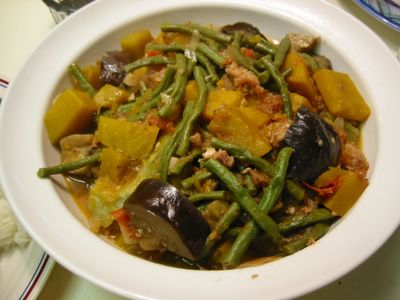 Due to the fact that our hometown is by the seaside so there is usually an abundance of fresh seafood. Only when alamang is nowhere to be found do we use the cooked bagoong. I do have a jar of homemade bagoong sitting in my kitchen but since I found this Cincalok (fermented alamang) in our local Chinese supermarket it's but natural that I use it. I believe the Baby Rambutan has blogged about this ingredient before. Cincalok has this pungent aroma that really complemented the vegetables. Although like the bagoong it's not for everybody.
Due to the fact that our hometown is by the seaside so there is usually an abundance of fresh seafood. Only when alamang is nowhere to be found do we use the cooked bagoong. I do have a jar of homemade bagoong sitting in my kitchen but since I found this Cincalok (fermented alamang) in our local Chinese supermarket it's but natural that I use it. I believe the Baby Rambutan has blogged about this ingredient before. Cincalok has this pungent aroma that really complemented the vegetables. Although like the bagoong it's not for everybody.As for the veggies, any number of combination can be tipped in the pot. I banned okra since I'm not too fond of the slimy sticky texture of it. Also I did not bother to rid the amplaya with its bitterness since my husband likes them as they are. In case you want to, marinate the ampalaya in salt for 30 minutes, squeeze out juice, then rinse well with water. I almost did not include ampalaya and sitaw because of the atrocious prices. But I can't call it pinakbet with just squash and aubergine so I have to buy them with my eyes closed. :)

Pinakbet
1 cup diced pork belly (or any fatty piece of pork) [optional]
1 Tbsp oil
2 tsp minced garlic
1 medium onion - sliced
3 medium tomatoes - sliced
2-3 Tbsp salted alamang (tiny shrimps) or bagoong
250 g squash/pumpkin - sliced roughly into 1-inch pieces
1 medium aubergine - sliced and quarted
125 g sitaw (yard long beans, snake beans) - cut into 2-inch pieces
250 g ampalaya (bitter gourd/melon)
1 cup water
salt and pepper
- Slice ampalaya lengthwise, remove inner white membrane with a spoon and discard. Slice each half diagonally into 1/4-inch thick pieces. Set aside.
- Put pork in a clay pot or medium size pot. Pour about 1/2 cup of water on it. Bring to boil then simmer until tender adding more hot water a little at a time if needed.
- Once almost all the water has evaporated, drizzle the oil on it. Bring up heat to medium - by this time the pork will be rendering fat. Fry the pork until crispy and golden brown.
- Put to one side of the pot and spoon off excess oil. You should only have about 1-2 Tbsp oil left in the pot.
- Saute garlic and onion for a few minutes. Add in tomatoes, salt and pepper to taste. Mix in the pork and cook until tomatoes are a bit soft.
- Stir in the alamang or bagoong. Cook for a few minutes.
- Add 1/2 cup water, bring to boil.
- Add the squash, aubergine, and sitaw. Simmer under cover for 3 minutes.
- Tip in the ampalaya and cook for a further 3 minutes or until all the vegetables are cooked.
- Remove from heat and serve.
No comments:
Post a Comment